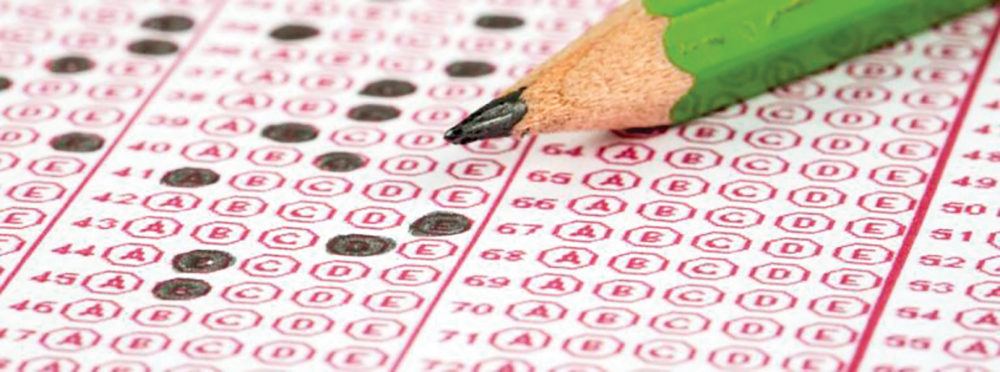
Testing is used as a tool to measure literacy and other skills. Students demonstrate their level of knowledge by answering certain questions. It is understood that teachers need a vehicle to evaluate students’ academic achievement and the scope of their acquired knowledge. Enter the standardized test, known by various names and initials. It should be noted that some schools utilize projects and other means to evaluate student achievement since not every student learns the same way and some don’t do well on tests. However, up until now the standardized test remains the “standard” in most schools.
The preoccupation with standardized tests and their widespread implementation has raised serious questions about their effectiveness and accuracy. In fact, many colleges no longer require SAT scores.
There is also a major debate about what should be measured and included in these tests. These questions bring us to a problem about the base of knowledge today. What should be studied and how students access information has radically changed. A generation ago we had to spend days at the library. Today’s knowledge is easily available through the internet. This changes our approach as to what kind of knowledge has to be delivered to the students and how to assess it.
The idea of literacy has been continuously changing according to society’s needs. Prior to the 20th century, literacy was understood as the three R’s “readin’ writin’ and ’rithmetic.” Now that there is widespread mandatory education through high school, education has been defined as a vehicle for obtaining applicable work/job skills and a means of gaining knowledge about political and social values. Nowadays, literacy is often linked to performing specific tasks related to certain industries and a more refined understanding of the political, economic, social and cultural environment. Witness the decline of liberal arts in our colleges. Students can now graduate college without ever reading great literature or studying history!
Tests are therefore also changing. They are becoming more cohesive, complex and refined, but not necessarily innovative or accurate. Standardized tests cannot measure students’ creativity because, in the process of preparing students for the test, the idea of the individuality and uniqueness of each student is lost. Teachers’ loss of freedom in the learning process hampers the ability to inspire students to develop their abilities at an individual pace and nurture critical values. Furthermore, teachers often have to devote much of their instructional time to prepare students for standardized tests rather than promote creative, innovative and critical thinking.
Teaching students to fit into the standard knowledge assessment box without considering their individual needs undermines the entire learning process. Children explore the world through touching, sensing and asking questions. This is how they learn and develop. An adult’s best way of learning is through inquiring and applying the knowledge thereby gained. Inquiry is a part of the critical skill, which brings progress.
Standardized curricula harm children’s ability to advance, reduce diversity, and deny differences. Standardization promotes intellectual compliance and textbook industries. Too many schools are fixated on passing tests. Teachers are often inhibited by their position as testers and technicians rather than as thoughtful practitioners who work for children.
Some researchers believe that forcing teachers to focus on content that can be measured in standardized tests and avoid more analytical material hinders the learning process. Test preparation mania endangers our diversity. Tests cannot measure critical thinking and truthfully evaluate students’ knowledge. Sometimes guessing and cramming can allow students to pass tests without any deep knowledge of a subject.
Teaching for tests instead of cultivating one’s central interests is just wrong. Students are being trained instead of encouraged in a creative and individual way. Standardized test practices tend to undermine any probability of a student wanting to learn or gain the capabilities to proceed on his own.
There are other arguments about the value of standardized testing. The test is taken at a particular time. A student can be sick, hungry, nervous, frustrated or disturbed by some events in their personal life. The test purports to evaluate a student’s past learning experience within a two- to three-hour period.
The problem of standardized testing and curricula should also be approached from the viewpoint that teachers lose the autonomy to implement the teaching
content, foster skills and enhance knowledge using a creative approach. While teachers should inspire students to enquire in their learning process constantly, teachers are more and more seen as facilitators of test preparation and fact-based curriculum implementers.
Testing becomes a mechanical system of evaluating knowledge. By giving the students multiple-choice questions, it has diminished the demand for creativity and broader understanding of the subject because the students can sometimes guess the answers.
The task of enhancing students’ knowledge becomes more challenging in view of the psychological pressure students endure in the process of preparation and passing tests.
A teacher is supposed to increase a student’s literacy. Teachers need to consider the students as individuals with their own unique abilities. If teachers were given a chance to evaluate students’ knowledge based on their individual ability, they could develop creativity, enhance knowledge, and prepare them for the modern job market.
Dr. Wallace Greene is the incoming principal of Yeshiva Keren HaTorah of Passaic-Clifton.









